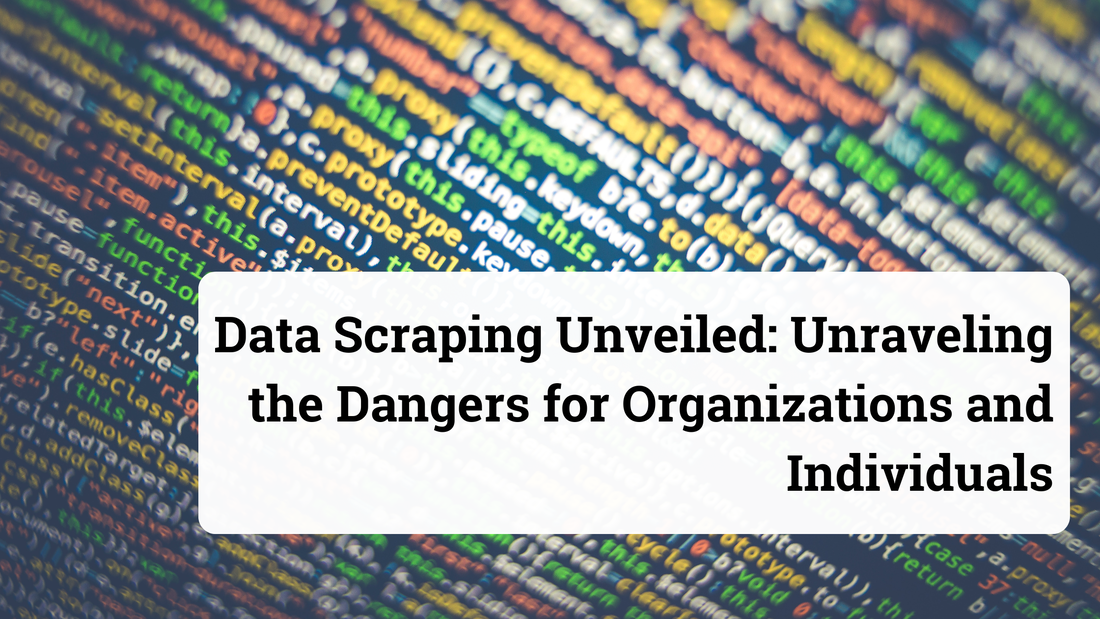|
In the digital age, information is power, and the practice of data scraping has emerged as a potent means of acquiring vast amounts of data quickly. However, this seemingly innocent technique holds significant dangers for both organizations and individuals.
In this article, we delve into the world of data scraping, exploring its mechanics, a real life case study of data scraping, its potential harms, and strategies to safeguard against its insidious effects. What Is Data Scraping? Data scraping, also known as web scraping, involves the automated extraction of data from websites and online sources. This technique utilizes specialized software or scripts to navigate websites and harvest data from systems owned by third parties. They extract the data, collate it, and store it either in a database or into a portable format like CSV. Initially intended for legitimate purposes like data analysis and market research, data scraping has been exploited for various malicious reasons. In particular, cybercriminals are obtaining data from data scraping to make their phishing attacks more efficient. Through scraping, not only do cybercriminals know which employees are most vulnerable to attack but also the positions in which they can exploit to deceive recipients into providing sensitive data. Real Life Case Study One very recent example was data scraping of Duolingo users’ public profile information that led to the data from 2.6 million users being leaked on a hacking forum. The compromised data included real names, login names, email addresses and internal service-related details. Cybercriminals were able to data scrape Duolingo users’ information due to an exposed application programming interface (API). This allows the retrieval of user profile information. Due to this exposed API, this allowed unauthorized access to email addresses that were associated with Duolingo accounts. Although Duolingo confirmed that the data was sourced from publicly available profiles, the fact that email addresses were also leaked is in fact alarming as this can facilitate targeted phishing attacks, and users’ email addresses are also not public information. This recent example of data scraping shows the importance of proactive security measures. As scammers now have Duolingo users’ email addresses and real names, this will allow for more realistic phishing attempts. This is worrying as this means that more people could fall for these scams. Regulators Urge The Tackling Of Data-Scraping Privacy Risks The very real impact of data scraping on privacy is especially evident by the joint statement signed by regulators from a dozen of international privacy watchdogs, such as Hong Kong’s OPCPD, Australia’s OAIC, and UK’s ICO. The statement urged mainstream social media platforms and operators of websites that host publicly accessible websites to protect user’s personal information from third-party data scraping. They also warned these platforms and operators that they do face a legal responsibility to protect users’ personal data in most markets as personal information is subject to data protection and privacy laws. As stated “mass data scraping of personal information can constitute a reportable data breach in many jurisdictions.” The joint statement had a clear message - mainstream social media sites need to be proactive about protecting their users’ personal information from scraping. The letter even contained recommended measures to reduce the risks of user’s personal data being scraped. They also included advice for individuals on how to protect themselves from the risks of scraping. Dangers of Data Scraping To Organizations
Dangers of Data Scraping To Individuals
Safeguarding Against Data Scraping Risks
Takeaway Data scraping, initially hailed as a tool for streamlining data extraction, has transformed into a double-edged sword capable of undermining privacy and intellectual property rights - posing risks for both organizations and individuals alike. As technology advances, so too must our understanding of the potential dangers of data scraping. By implementing robust security measures, adhering to legal regulations, and adopting cautious online practices, we can collectively protect ourselves and our digital world from the perils of data scraping. In this interconnected age, vigilance is key to safeguarding the integrity of information and the sanctity of our digital experiences. Related Topics When Cybercriminals Go Phishing: Email Threats On The Rise The Rise Of Phishing: Safeguarding Against Digital Deception Protect Yourself: Best Practices to Combat Phishing Attacks The Common Signs Of Being Cyberattacked 7 Types of Cyber Security Measures SMEs Need to Protect Their Business Comments are closed.
|
Archives
June 2024
Categories
All
|
|
© 2021, TAFA HOLDINGS (S) PTE LTD. ALL RIGHTS RESERVED
|


 RSS Feed
RSS Feed